Karnataka is one of the major southern states of India with a well-connected road network in its inter-urban and rural areas, enabling movement across the region.
Karnataka road tax holds immense importance in the development and maintenance of this network to provide safe and efficient means of transport to people living in the state as well as travelers coming from other parts of the country and the world.
In this detailed article, we will explain in detail about Karnataka road tax, its distribution, the way it is determined, and how it is possible to pay it.
Also, in this blog post on Karnataka road tax, we will discuss in detail the effectiveness of road tax in addressing the needs of vehicle owners, regulatory requirements and concerns, special cases, fines and penalties for non-payment of fees, and its contribution to the state revenue.
- What Is the Karnataka Road Tax?
- What is the Legal Framework Governing Karnataka Road Tax?
- How is Karnataka Road Tax Calculated?
- How to Calculate Road Tax in Karnataka?
- What is the Karnataka Road Tax for Different Vehicle Categories?
- How to Pay Karnataka Road Tax Payment?
- What are the Documents Required to Pay Karnataka Road Tax Payment?
- What are the Exemptions and Rebates on Karnataka Road Tax?
- What are the Tax Rates and Slabs of Karnataka Road Tax?
- What are the Penalties for Non-Payment of Karnataka Road Tax?
- How to Get a Refund on Karnataka Road Tax?
- What is the Transfer of Vehicle Ownership and Karnataka Road Tax?
- What is the Importance of Road Tax for the State?
- What is the Comparison Between Karnataka Road Tax vs. Other States?
- What is the Karnataka Road Tax Structure for Different Vehicle Types?
- How to Check the Status of Karnataka Road Tax Payment Online?
- What is the RTO List of Karnataka?
- What are the Advantages of Electric Vehicle (EV) Tax?
- What is the Temporary Registration and Karnataka Road Tax Payment?
- What is the Procedure for Transferring Vehicle Registration from Another State?
- What is the Green Tax for Old Vehicles?
- What is the Karnataka Road Tax for Company-Leased Vehicles?
- What is the Impact of Karnataka Road Tax on Vehicle Prices?
- What is the Special Road Tax for Goods Transport Vehicles?
- What are the Benefits of Timely Road Tax Payment?
- What are the Recent Amendments and Updates in the Karnataka Road Tax Policy?
- What is the Contact Information of the Karnataka Transport Department?
- In Conclusion
- FAQs
- 1. Can I transfer my vehicle to another person without paying the road tax dues?
- 2. Is road tax applicable if I am using my vehicle temporarily in Karnataka?
- 3. Can I appeal against a road tax penalty?
- 4. What happens if my vehicle is stolen? Do I still need to pay road tax?
- 5. How is road tax calculated for vehicles converted to CNG or LPG?
- 6. Can Karnataka road tax be paid in advance for multiple years?
- 7. Is there any special road tax for vintage or classic cars?
- 8. Can I pay Karnataka road tax in another state where I live temporarily?
- 9. Is it possible to get a tax exemption for vehicles used for specific purposes like education or healthcare?
- 10. Does Karnataka Road Tax differ for imported vehicles?
- 11. What should I do if I lose my road tax payment receipt?
- 12. Can I transfer my vehicle from Karnataka to another state without paying additional road tax there?
- 13. Is road tax mandatory for vehicles used exclusively on private property?
- 14. Do vehicles used for charitable purposes receive any road tax benefits?
- 15. Can road tax be adjusted if I modify my vehicle?
What Is the Karnataka Road Tax?
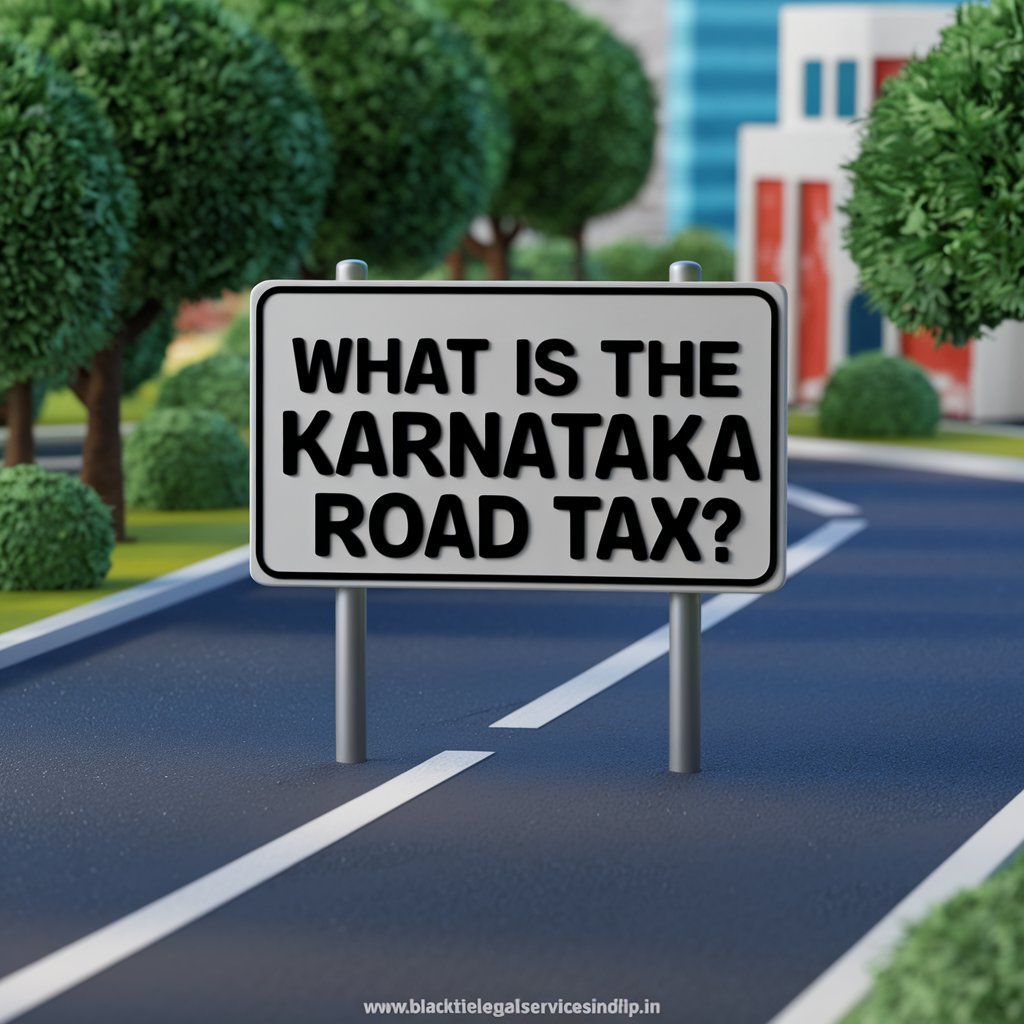
Road tax is a mandatory fee that the Karnataka government levies on all registered vehicles plying in the region. This is the main reason why the tax is levied as it is mainly used to maintain and expand the roads.
Another duty that all car owners have to fulfill is the Karnataka road tax which helps in maintaining the same roads that we use. This tax is paid when a person buys a car for personal or business use or transfers a vehicle license from another state to Karnataka.
What is the Legal Framework Governing Karnataka Road Tax?

The Karnataka Motor Vehicles Taxation Act, 1957, is the primary legislation that governs the imposition of road tax in the state. This act provides a detailed framework outlining the rates, procedures, and responsibilities of vehicle owners concerning road tax. The Motor Vehicles Act, 1988, also plays a significant role in regulating road taxation policies across India, including Karnataka. These laws ensure the proper functioning of transportation and infrastructure management by mandating tax payments.
How is Karnataka Road Tax Calculated?
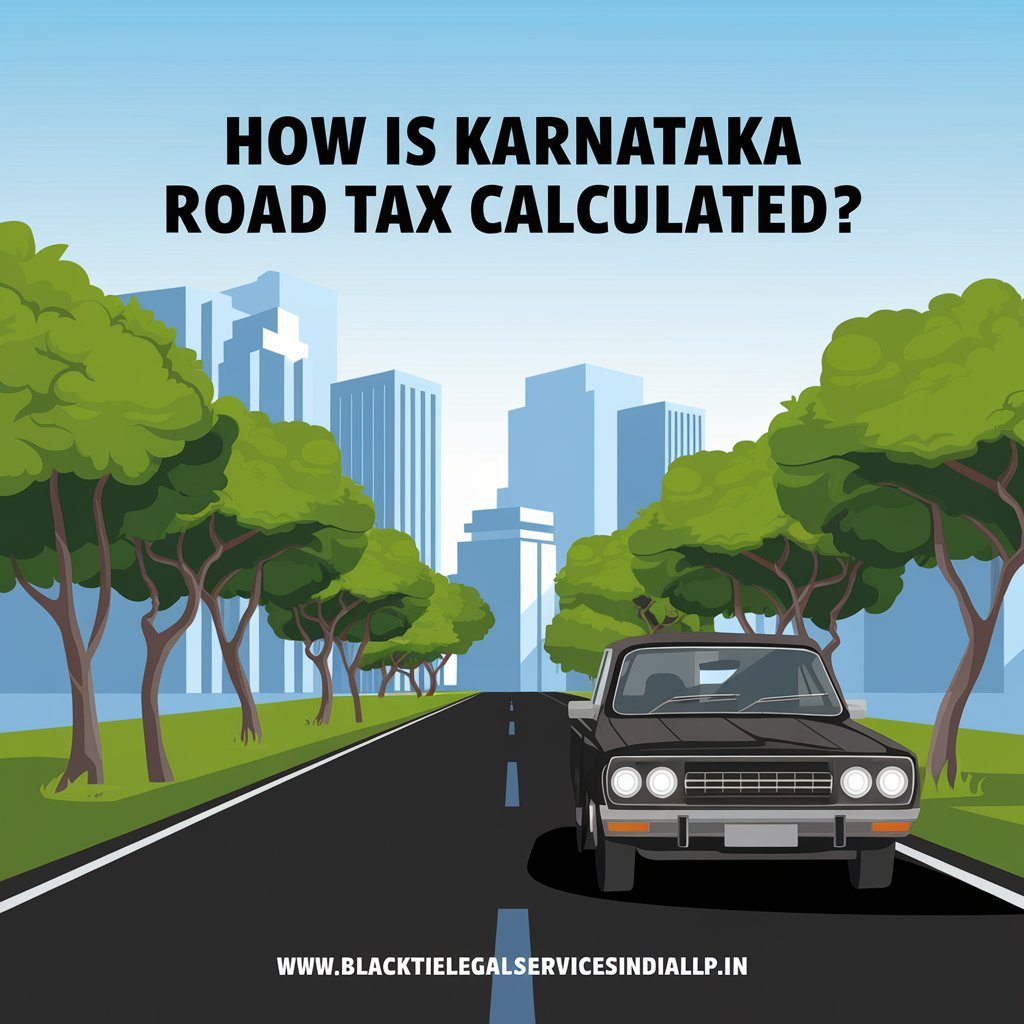
The Karnataka Motor Vehicles Taxation Act of the year 1957 is the fundamental law that sets the rules for the collection of road taxes in the state of Karnataka. This act provides the types of rates, procedures, and other roles and responsibilities of vehicle owners with regard to road tax.
The Motor Vehicles Act, of 1988, also plays a major role in the formulation of its policies towards road taxation in India, including the state of Karnataka. In this case, these laws help regulate the efficiency of transportation and infrastructure through the required tax payment.
How to Calculate Road Tax in Karnataka?
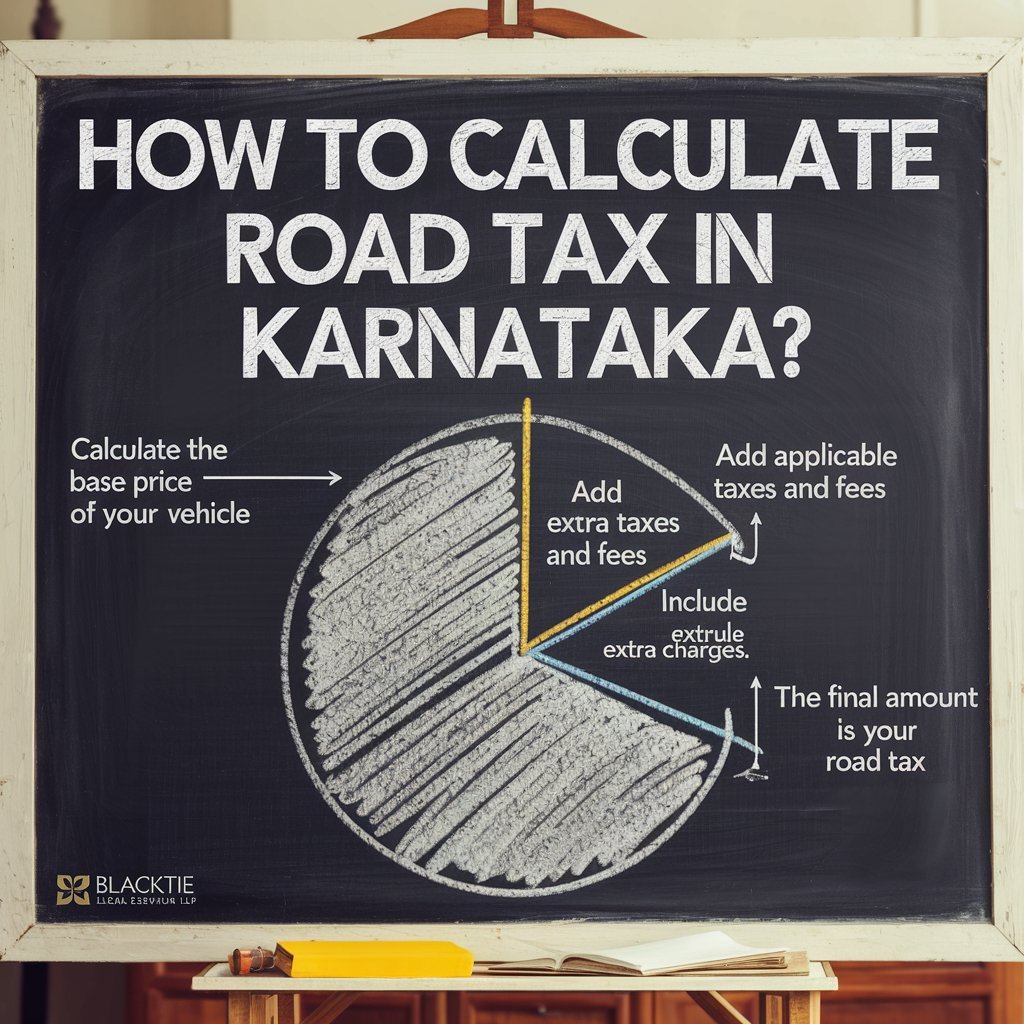
Karnataka road tax includes certain factors that are taken into consideration and they are the type and category of the vehicle, the age of the vehicle, and its engine capacity, etc. The calculation also depends on whether the vehicle is private or commercial so that proper calculation can be done.
Types of Vehicles
Vehicles are broadly classified into:
- Two-wheelers
- Four-wheelers (cars, SUVs)
- Commercial vehicles (buses, trucks, taxis)
- Electric vehicles
Factors Affecting Road Tax Calculation
- Type of Vehicle: There are different Karnataka road taxes based on factors such as two-wheelers, four-wheelers, and commercial vehicles.
- Age of Vehicle: Older model cars may be charged relatively less tax, as their value has probably depreciated.
- Engine Capacity (CC): Engines with larger capacity are taxed more than those with smaller engine capacity.
- Purpose of Use: Personal vehicles are taxed differently from commercial vehicles.
- Cost of Vehicle: when it comes to high-end or expensive vehicles, the taxes are higher because of the value of the car.
What is the Karnataka Road Tax for Different Vehicle Categories?
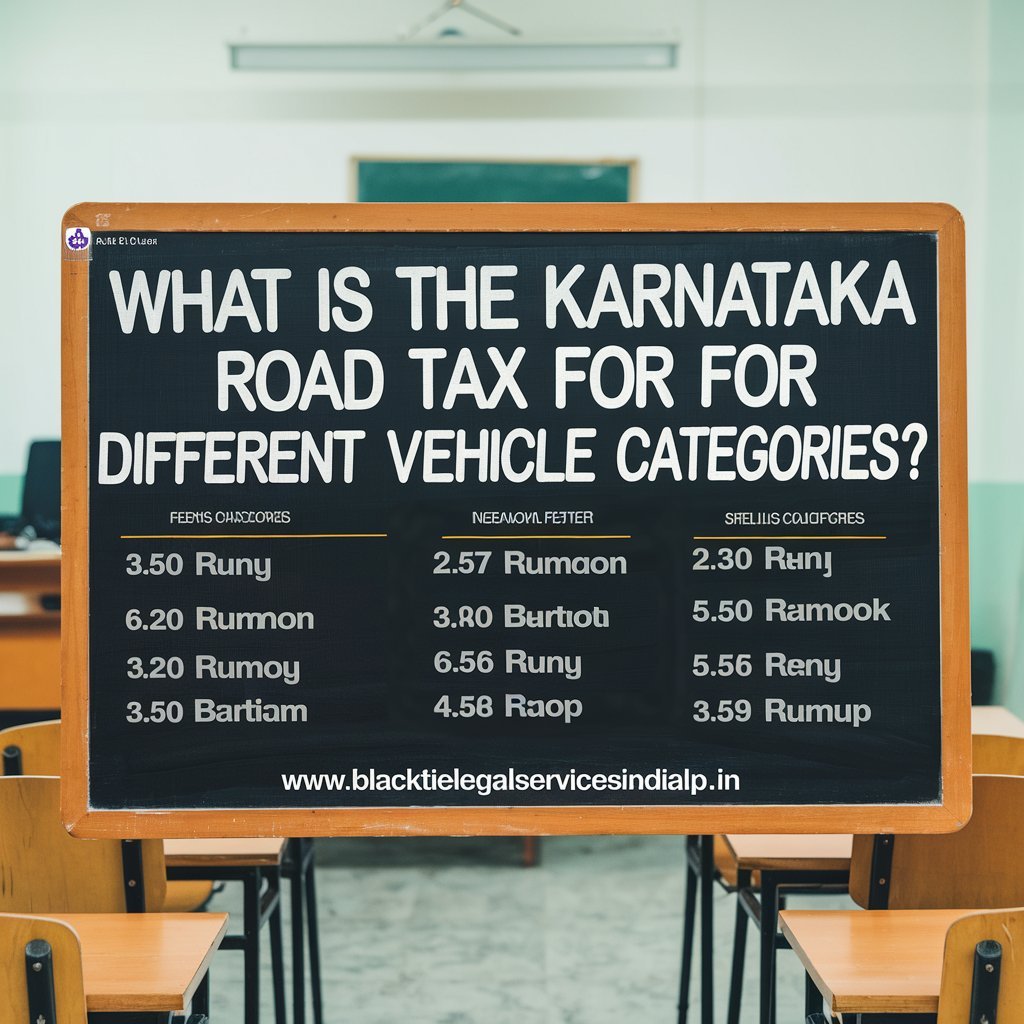
For Karnataka road tax, the government has made some categories for all vehicles on the basis of which their tax is collected and we have understood in great detail what these categories are:
Two-wheelers
In the case of two-wheelers, i.e. bikes and three-wheelers, the Karnataka road tax depends on the price of the vehicle and the engine power. In the case of a two-wheeler priced up to Rs 50,000, theKarnataka road tax payable can be around 10% of the cost price of the vehicle. For ‘high-end’ bikes, the percentage can be as high as 12-15%.
Cars and four-wheelers
Karnataka has implemented a measure of differentiating road taxes for cars, wherein road taxes are governed according to the price of the car.
Cars priced up to Rs 5 lakh are taxed at 13%. For cars within Rs 5-10 lakh, the tax is 14% and for luxury car brands above Rs 10 lakh, the tax can be as high as 17%.
Commercial Vehicles
Trucks are classified based on their gross vehicle weight and type of operation, such as passenger or freight, buses and taxis are similarly classified based on the number of passengers they can accommodate at a given time.
The rates applicable to these vehicles are generally slightly higher than those charged to private vehicles as these cars make frequent and extensive use of the roads.
Electric Vehicles
The Karnataka government has provided tax incentives or preferably lower taxes for electric vehicles or EVs. Generally, EVs are exempted from paying taxes compared to their counterparts that use petrol and diesel fuel.
How to Pay Karnataka Road Tax Payment?
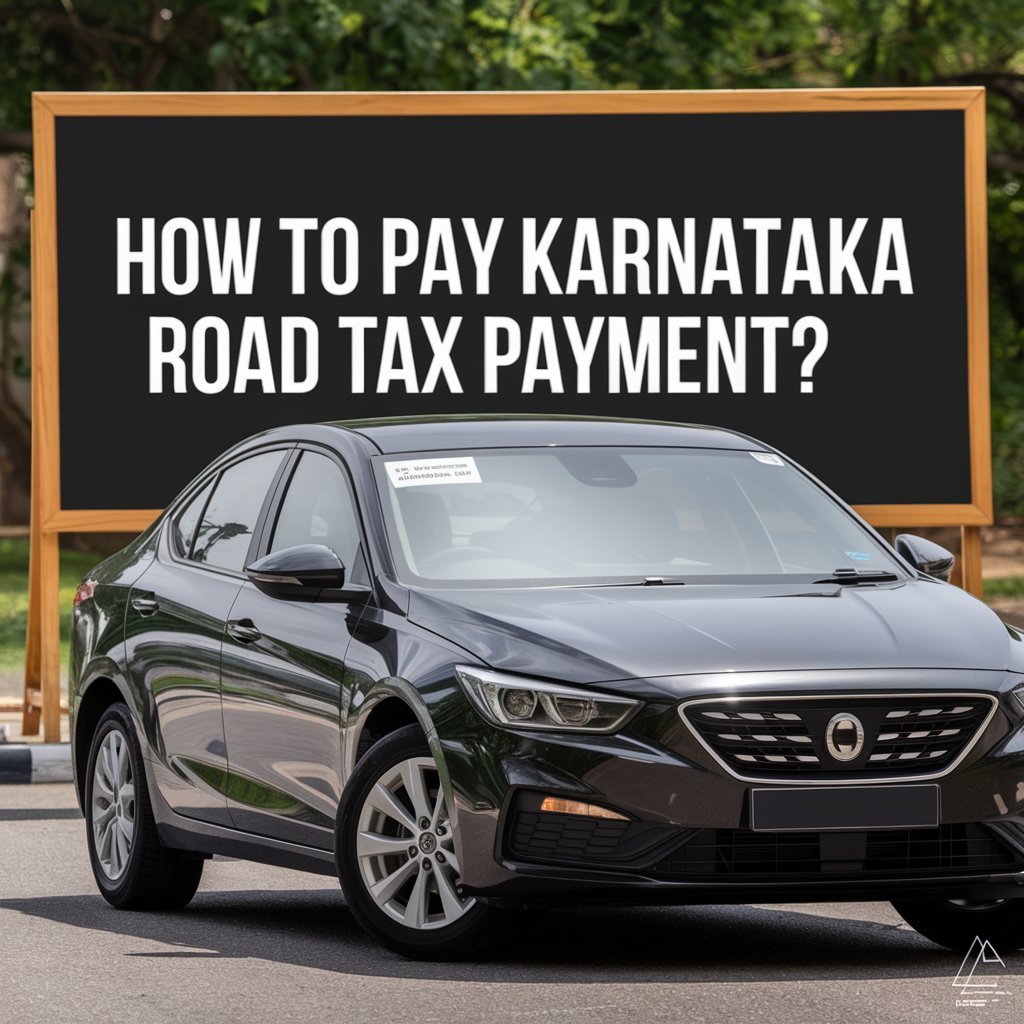
To pay Karnataka road tax, you can choose between online and offline methods. Here’s how to do both:
Online Payment:
You can pay Karnataka road tax online through the official Karnataka Transport Department website or the Karnataka One portal.
Steps:
- Visit the Karnataka Transport Department website (https://transport.karnataka.gov.in ) or the Karnataka One portal https://www.karnatakaone.gov.in.
- Under the ‘My Account option’, select the ‘Vehicle Registration’ tab.
- Choose the road tax payment option.
- You can enter your vehicle details like registration number, chassis number, etc.
- The road tax will also be displayed by the system according to the amount you need to pay.
- Go to the option of payment using debit/credit card, net banking, online payment, or UPI.
- You will receive an acknowledgment and an e-receipt upon completion of the payment.
Offline Payment:
You can pay Karnataka road tax offline by visiting the Regional Transport Office (RTO) in your area.
Steps:
- Visit your nearest RTO office.
- Fill in the required documents (road tax payment form).
- Upload your car documents (registration certificate, identity proof, etc.).
- There will be various charges levied by the RTO staff, including the road tax.
- Pay the tax amount at the RTO by cash, demand draft, or any other mode of payment.
- Make sure to keep the payment receipt for future use.
What are the Documents Required to Pay Karnataka Road Tax Payment?

When paying Karnataka Road Tax, ensure you have the following documents ready:
- Vehicle Registration Certificate (RC)
- Invoice of the vehicle (in case of new purchases)
- Proof of Address (Aadhaar card, utility bills, etc.)
- Identity proof (PAN card, driving license)
- Insurance certificate of the vehicle
- Previous road tax receipt (if applicable)
Both methods are quite simple; however, online payment has an advantage as a client does not have to travel to the RTO office.
What are the Exemptions and Rebates on Karnataka Road Tax?
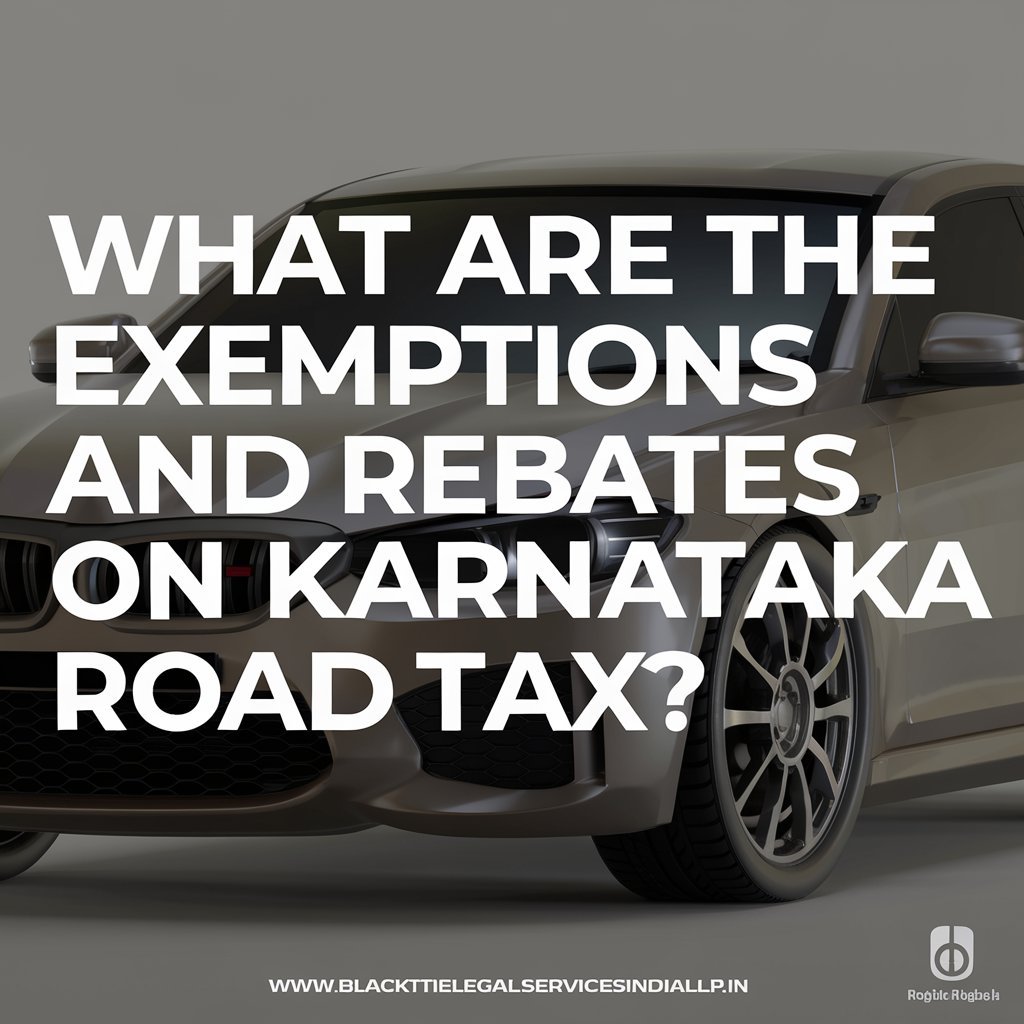
Some vehicles in Karnataka are completely exempted from paying road tax, while others fall into lower tax brackets or are eligible for exemptions depending on the type of vehicle and its use.
Government Vehicles
Some cars are not required to pay Karnataka road tax, including those owned by the central or state government.
Agricultural Vehicles
Tractors and other forms of automobiles that are used solely for pulling agricultural equipment and conducting farming are usually exempted from paying Karnataka road tax, as long as they comply with the state government requirements.
Electric Vehicles
As a result of this noble effort, the Karnataka government has provided substantial tax cuts or in fact – direct tax exemptions – to electric cars.
What are the Tax Rates and Slabs of Karnataka Road Tax?
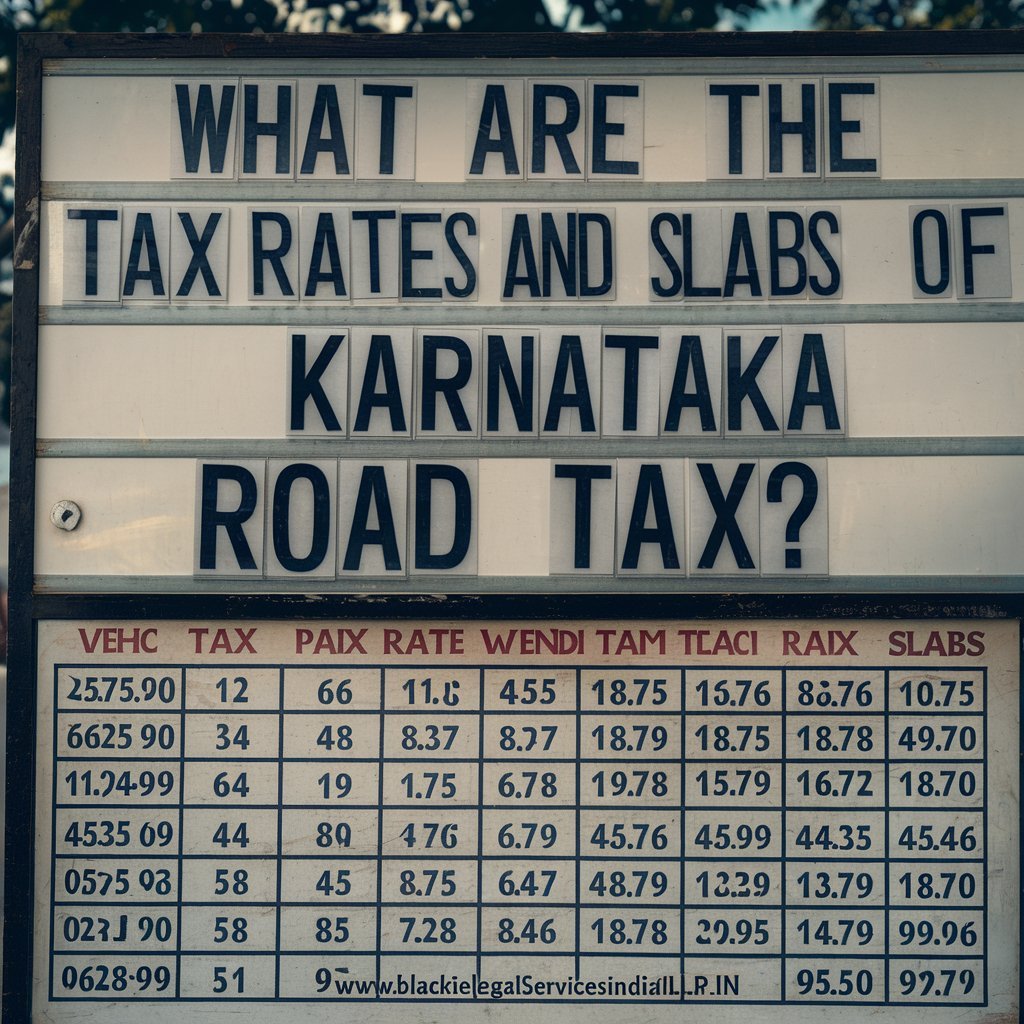
Here’s a table showing the Karnataka Road Tax Rates and Slabs for different vehicle types:
1. Two-Wheelers
| Vehicle Price (Ex-Showroom) | Karnataka Road Tax Rate |
|---|---|
| Up to ₹50,000 | 10% of vehicle cost |
| ₹50,000 – ₹1,00,000 | 12% of vehicle cost |
| Above ₹1,00,000 | 18% of vehicle cost |
2. Four-Wheelers (Private Cars)
| Vehicle Price (Ex-Showroom) | Karnataka Road Tax Rate |
|---|---|
| Up to ₹5,00,000 | 13% of vehicle cost |
| ₹5,00,000 – ₹10,00,000 | 14% of vehicle cost |
| ₹10,00,000 – ₹20,00,000 | 17% of vehicle cost |
| Above ₹20,00,000 | 18% of vehicle cost |
3. Electric Vehicles (All Types)
| Type of Electric Vehicle | Karnataka Road Tax Rate |
|---|---|
| Two-Wheelers | 4% of vehicle cost |
| Four-Wheelers | 4% of vehicle cost |
4. Commercial Vehicles
| Type of Commercial Vehicle | Karnataka Road Tax Rate |
|---|---|
| Light Goods Vehicle (LGV) | 7.5% of vehicle cost |
| Heavy Goods Vehicle (HGV) | 7.5% of vehicle cost |
| Passenger Vehicles (up to 12 seats) | 7.5% of vehicle cost |
| Passenger Vehicles (more than 12 seats) | 5% of vehicle cost |
5. Imported Vehicles
| Type of Vehicle | Karnataka Road Tax Rate |
|---|---|
| Two-Wheelers (Imported) | 18% of vehicle cost |
| Four-Wheelers (Imported) | 18% of vehicle cost |
Notes:
- Luxury vehicles: Higher-end luxury vehicles may attract an 18% tax slab.
- Vintage vehicles: Exempted from road tax in Karnataka.
Here is a list of major RTO offices in Karnataka, along with their RTO codes and locations:
What are the Penalties for Non-Payment of Karnataka Road Tax?
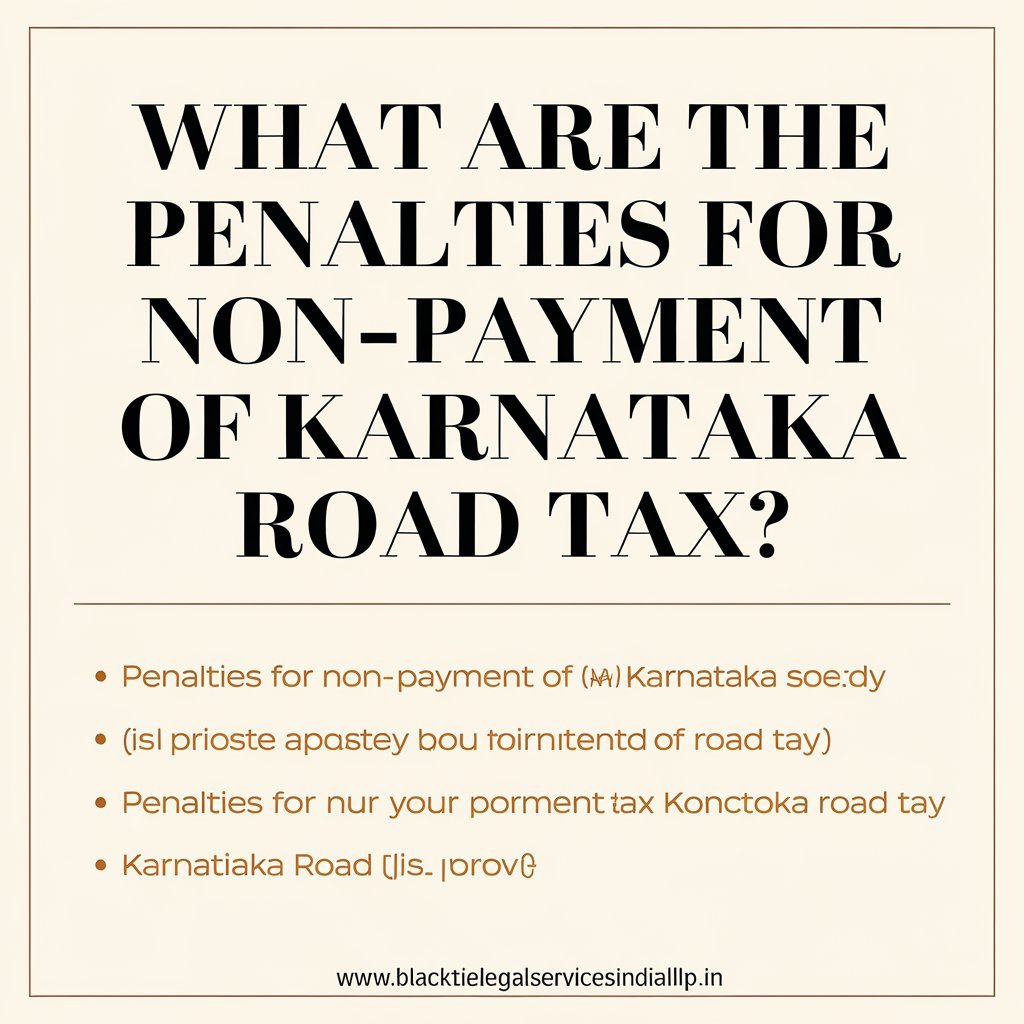
Timely payment of road tax is mandatory. Failure to pay the tax within the stipulated time can lead to penalties and interest charges.
Delays in Payment
If the road tax is not paid on time, the vehicle owner will have to pay a penalty ranging from 2% to 4% per month depending on the time of delay.
Consequences for Defaulters
Permanent default often results in the vehicle being seized by the authorities and to get the car back, one has to shell out so much cash. Moreover, non-payment of road tax also becomes an issue when one wants to sell the car or transfer the title.
How to Get a Refund on Karnataka Road Tax?
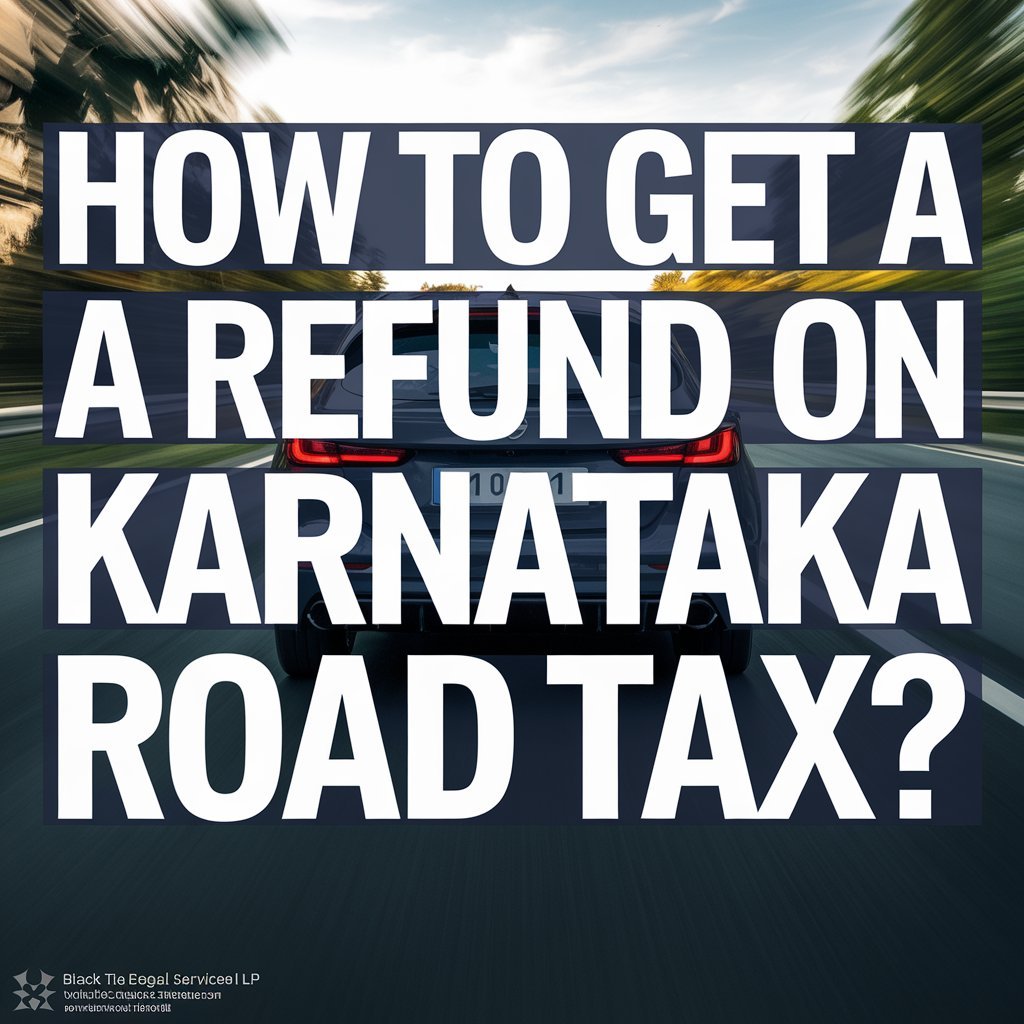
There are certain special occasions when you are allowed to get a refund of road tax, for example when one shifts the automobile to another state or if it is damaged. The process involves:
- The process involves filing an application for a refund at the RTO.
- Passing important documents like the road tax receipt of the new state if one is shifting from one state to another.
- Proof of scrapping of the vehicle (if the car is donated).
The refund is calculated with respect to the time remaining on the road tax.
What is the Transfer of Vehicle Ownership and Karnataka Road Tax?

In cases where the transfer of the vehicle takes place from a registered state within Karnataka or a transfer of the vehicle from another state to Karnataka, the new owner is legally required to pay road tax.
If the vehicle is transferred from other states, the vehicle has to be re-registered and, if the vehicle is being used for more than a year, Karnataka road tax has to be paid.
What is the Importance of Road Tax for the State?
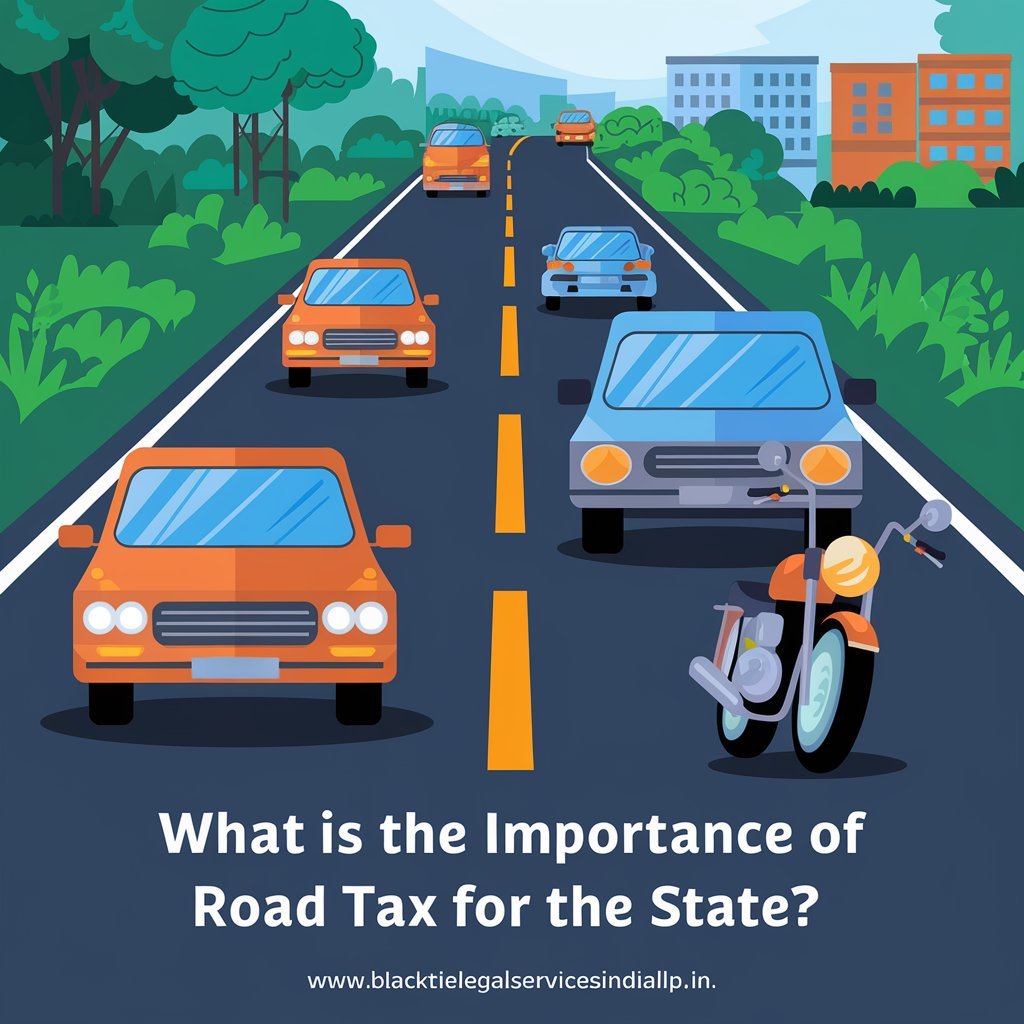
Road tax is one of the major sources of revenue for Karnataka and it has been useful in infrastructure development along with building more roads and maintaining the existing ones.
The revenue generated helps the state cover several highways, rural roads, and urban roads to provide adequate accessibility throughout the state. It also uses the collected money to enhance road safety and execution of various transportation undertakings.
What is the Comparison Between Karnataka Road Tax vs. Other States?
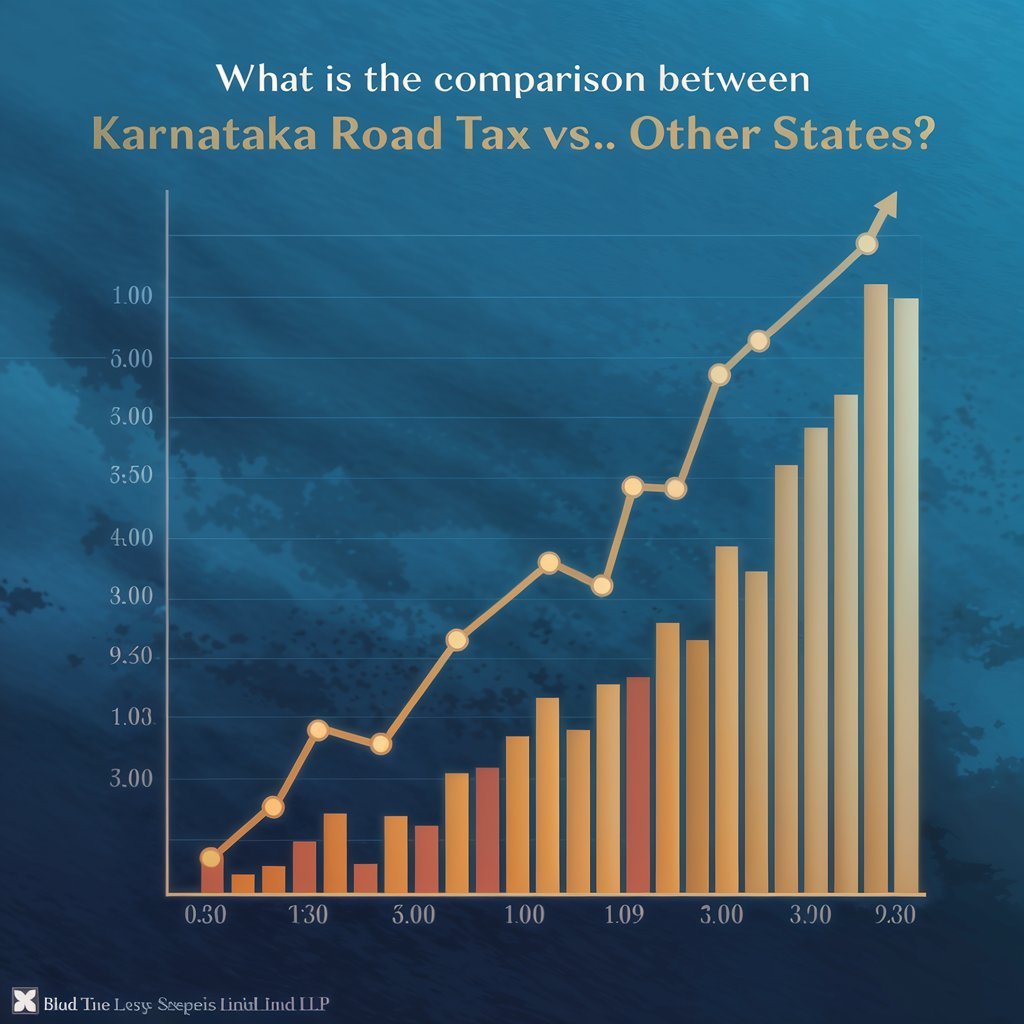
Karnataka charges slightly higher road tax than other states in India, especially in the case of expensive vehicles. Some states like Delhi and Gujarat have lower taxes on electric vehicles, while in Karnataka; they only charge taxes based on the price and engine capacity of the vehicles. This makes road tax in Karnataka one of the major expenses that new vehicle owners have to bear, let alone luxury and specialty cars.
What is the Karnataka Road Tax Structure for Different Vehicle Types?
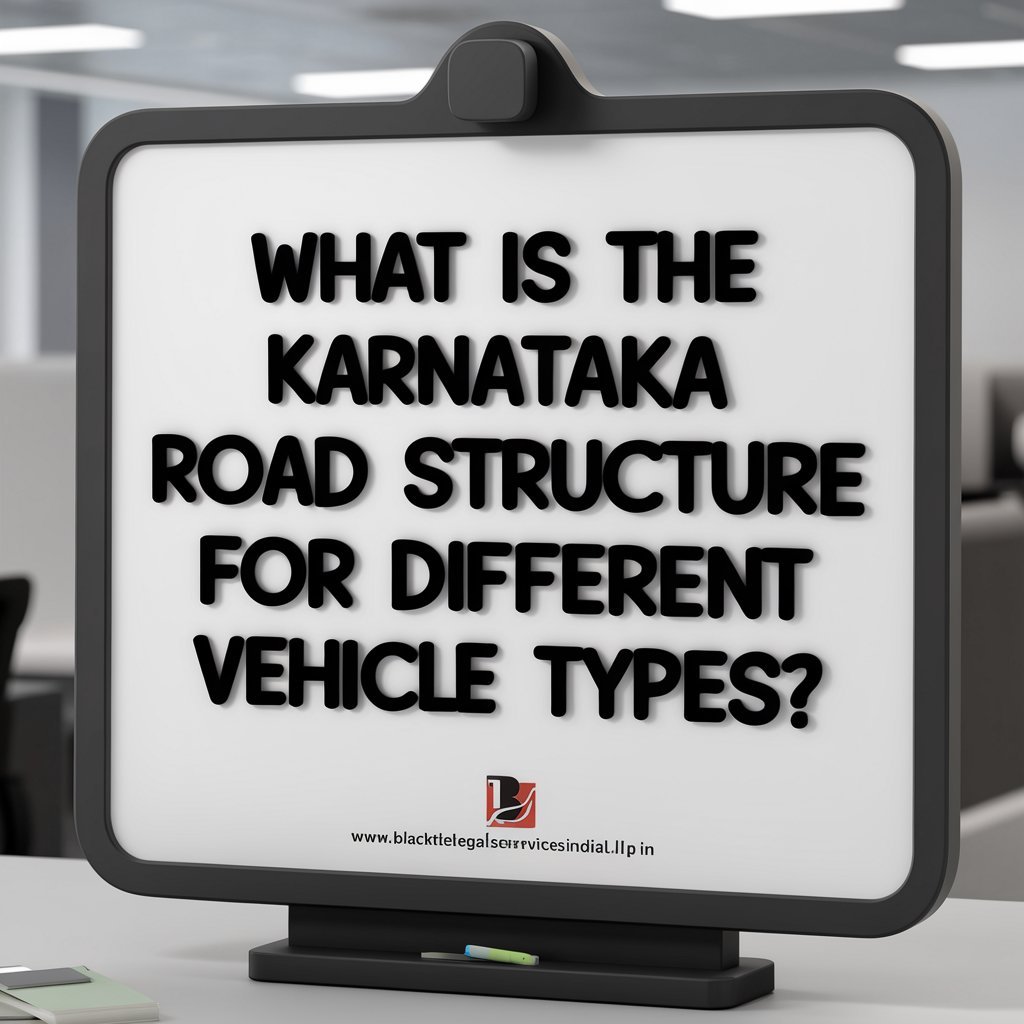
We have explained the Karnataka Road Tax Structure for Different Vehicle Types very well so that you can get more information about each aspect of it:
- Private Vehicles: If we talk about private vehicles including cars and bikes, the Karnataka road tax is a one-time tax that is levied for the life span of the vehicle which is fifteen years. The amount depends on the make or model of the vehicle, and engine capacity, whether it is petrol, diesel, or electric. Car models with bigger engines in CC or luxury models are taxed more.
- Commercial Vehicles: Private cars are not required to make any annual payment, commercial modes of transport like lorries, taxis, and buses pay tax annually. The road tax of commercial vehicles is determined based on the weight of the vehicle, the number of seats in the case of cars, and the use of the vehicle i.e. carrying goods or carrying passengers. Taxis and buses have different tax rates from trucks as we will see below.
- Two-Wheelers: Tax on two-wheelers is also paid once in a lifetime. It is also determined by the price of the vehicle and its engine size. Motorcycle tax is proportional to the motorcycle segment, where budget motorcycles and scooters are taxed less, while higher-end motorcycles are taxed more.
How to Check the Status of Karnataka Road Tax Payment Online?
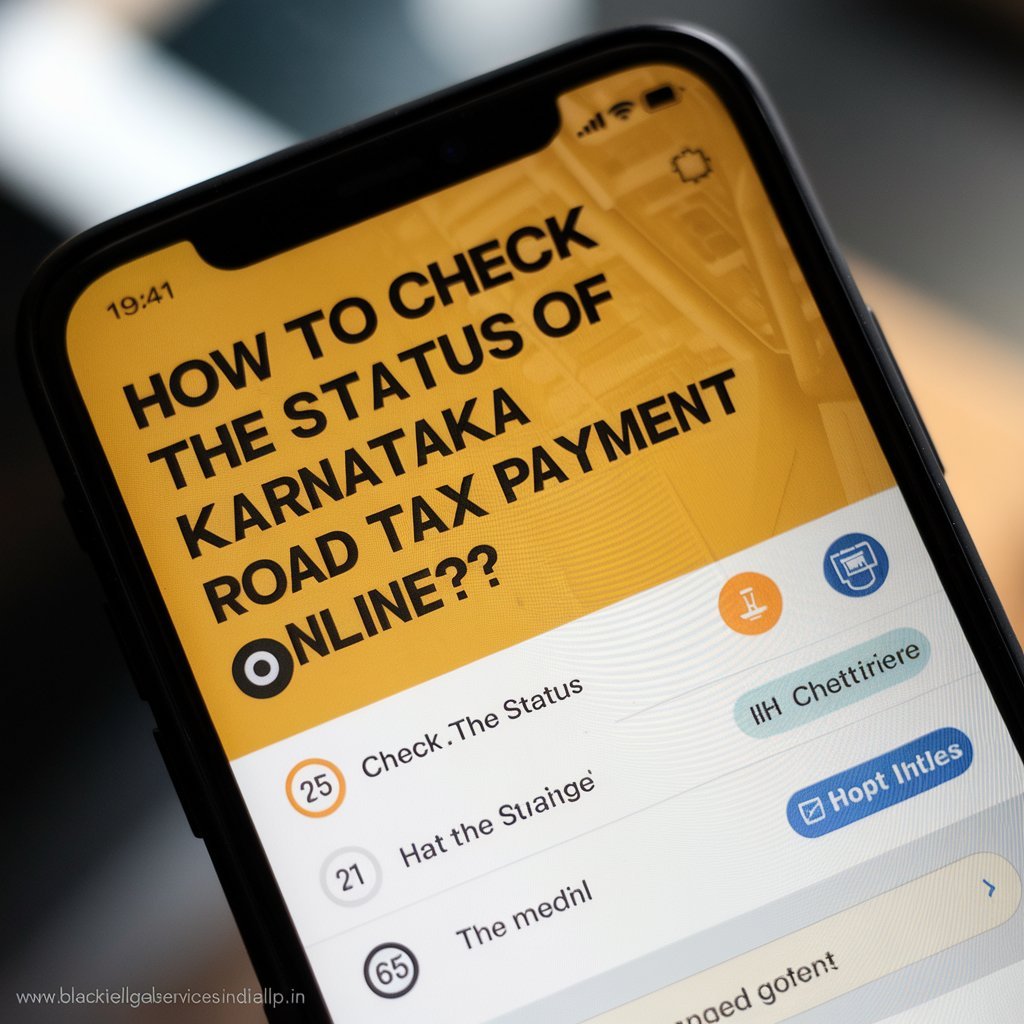
To check the status of your Karnataka road tax payment online, follow these steps:
Steps to Check Road Tax Payment Status Online:
Visit the Official Karnataka Transport Department Website:
- Go to https://transport.karnataka.gov.in or the Vahan portal at https://vahan.parivahan.gov.in/vahanservice.
Select the ‘Check Payment Status’ Option:
- On the homepage, locate the relevant link to check service-related car or road tax status.
Enter Your Vehicle Details:
- Enter your vehicle’s registration number, chassis number, or other required details.
Check the Payment History:
- You can check your road tax payment record and its current status on the web. Depending on the payment method, you will be able to see ‘paid’, ‘pending’, or ‘failed’.
Download or Print the Payment Receipt:
- In the event that the payment has been made, you can view or even obtain a hard copy of the payment receipt.
Alternative Method: Karnataka One Portal
- Visit the Karnataka One portal at https://www.karnatakaone.gov.in.
- On the page that opens up, click on the ‘Login’ or ‘Register’ button as per your wish.
- Now, locate the Road Tax Payment Status section.
- Please, fill in your vehicle details to know the payment status at present.
By following the above-mentioned steps you can easily track your road tax payment. Hope you have a great day; feel free to contact me if you need help!
What is the RTO List of Karnataka?

Here is a list of major RTO offices in Karnataka, along with their RTO codes and locations:
Karnataka RTO List
| RTO Code | RTO Location |
|---|---|
| KA-01 | Bangalore (Central) |
| KA-02 | Bangalore (West) |
| KA-03 | Bangalore (East) |
| KA-04 | Bangalore (North) |
| KA-05 | Bangalore (South) |
| KA-06 | Tumkur |
| KA-07 | Kolar |
| KA-08 | KGF (Kolar Gold Fields) |
| KA-09 | Mysore |
| KA-10 | Mandya |
| KA-11 | Madikeri |
| KA-12 | Chikmagalur |
| KA-13 | Hassan |
| KA-14 | Shimoga |
| KA-15 | Sagar |
| KA-16 | Chitradurga |
| KA-17 | Davangere |
| KA-18 | Bellary |
| KA-19 | Hospet |
| KA-20 | Bidar |
| KA-21 | Bhalki |
| KA-22 | Raichur |
| KA-23 | Mangalore |
| KA-24 | Udupi |
| KA-25 | Puttur |
| KA-26 | Belgaum |
| KA-27 | Chikkodi |
| KA-28 | Dharwad |
| KA-29 | Gadag |
| KA-30 | Haveri |
| KA-31 | Bijapur |
| KA-32 | Bagalkot |
| KA-33 | Karwar |
| KA-34 | Sirsi |
| KA-35 | Gulbarga |
| KA-36 | Yadgir |
| KA-37 | Chikkaballapur |
| KA-38 | Ramanagara |
| KA-39 | Devanahalli |
| KA-40 | Tiptur |
| KA-41 | Hunsur |
| KA-42 | Sakleshpura |
| KA-43 | Honnavar |
| KA-44 | Jamkhandi |
| KA-45 | Gokak |
| KA-46 | Yelahanka |
| KA-47 | Electronic City, Bangalore |
| KA-48 | Nelamangala |
| KA-49 | Krishnarajapuram |
| KA-50 | Yeshwanthpur |
This is a list of RTO codes and their corresponding locations across Karnataka. Each RTO office handles vehicle registration, issuance of driving licenses, and road tax payments.
What are the Advantages of Electric Vehicle (EV) Tax?
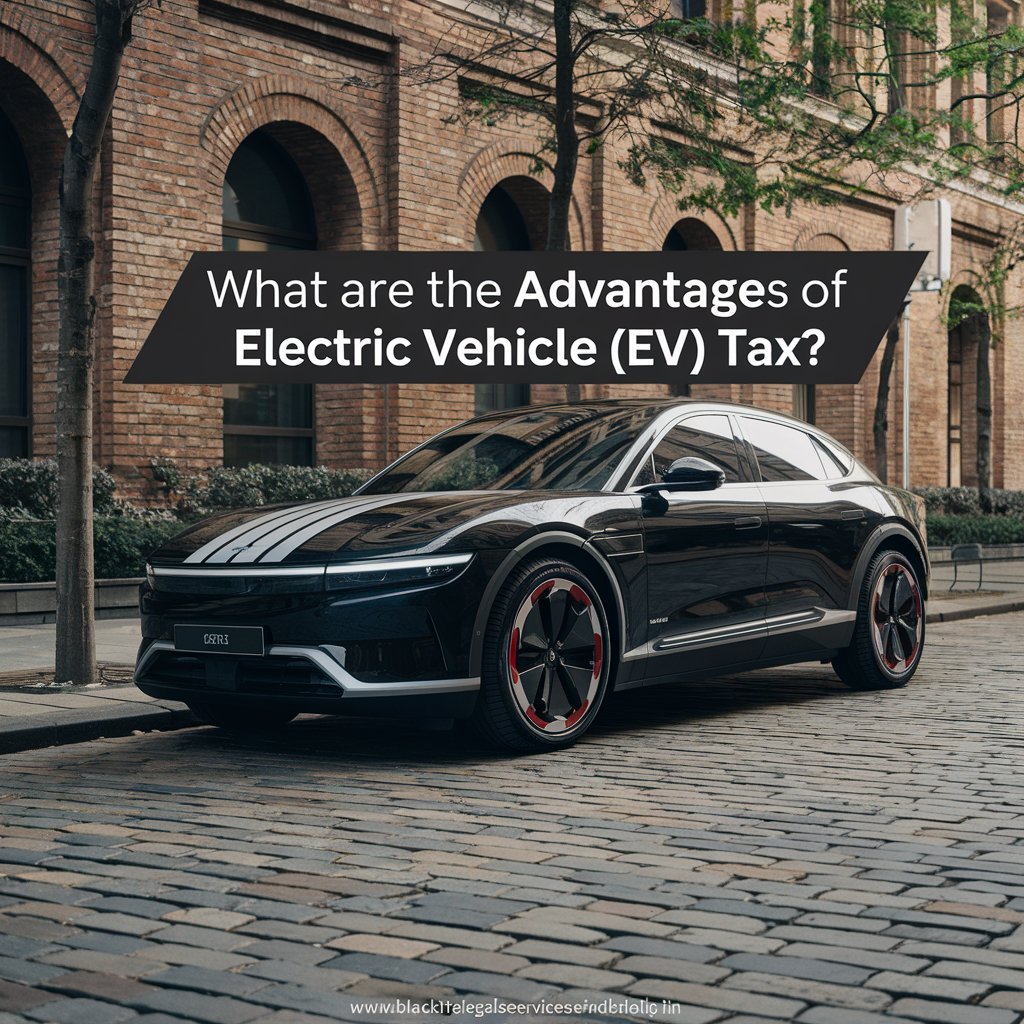
EVs are classified as having lower or even no road tax in many situations, depending on the specific category of the car in question. This tax credit is under the state’s Green Mobility scheme that the government has implemented to reduce the emission of gases into the atmosphere through the use of environmentally friendly modes of transport.
What is the Temporary Registration and Karnataka Road Tax Payment?
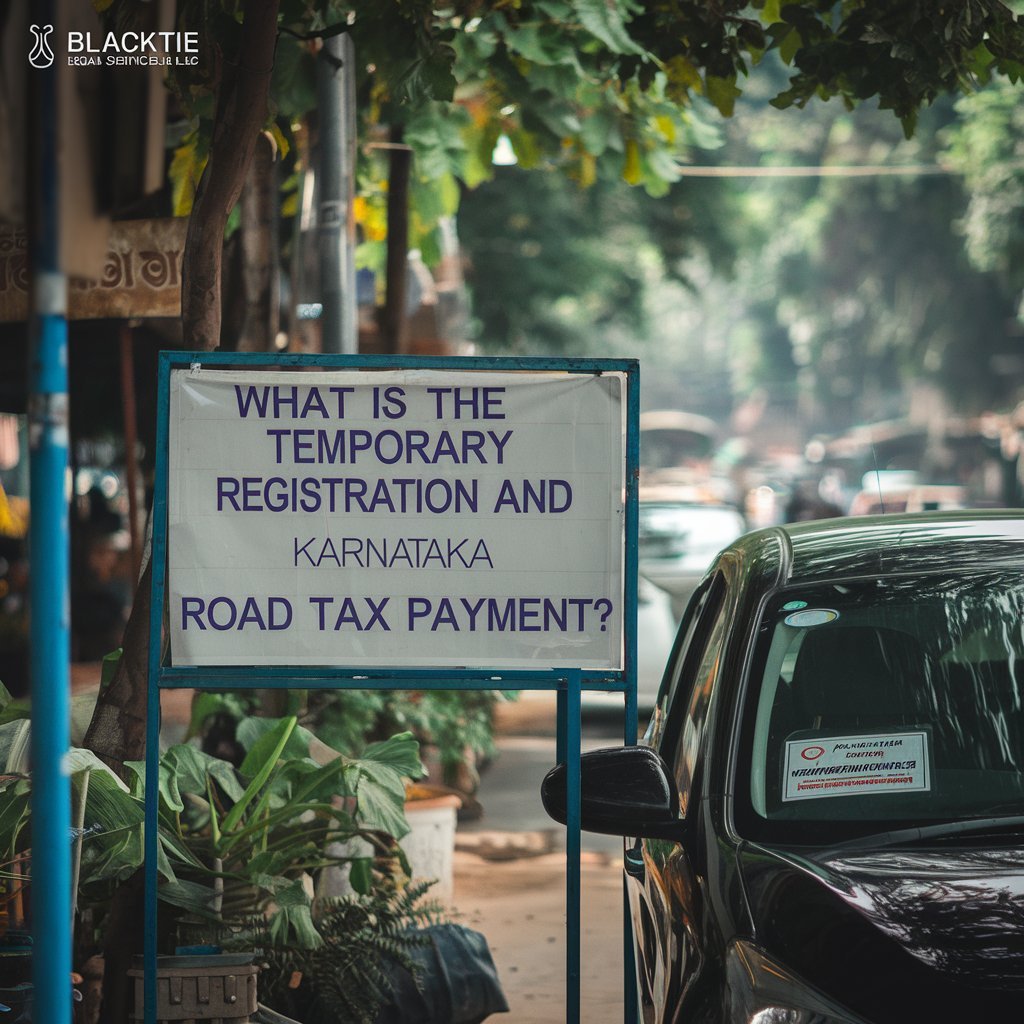
If you are planning to use a vehicle brought from another state, you will have to get it registered immediately and get a temporary registration number and you will have to pay the taxes levied on Karnataka roads.
If the vehicle is going to be used in Karnataka for more than a year, you will have to re-register it with the Karnataka RTO and pay road tax as per Karnataka tax rates.
What is the Procedure for Transferring Vehicle Registration from Another State?
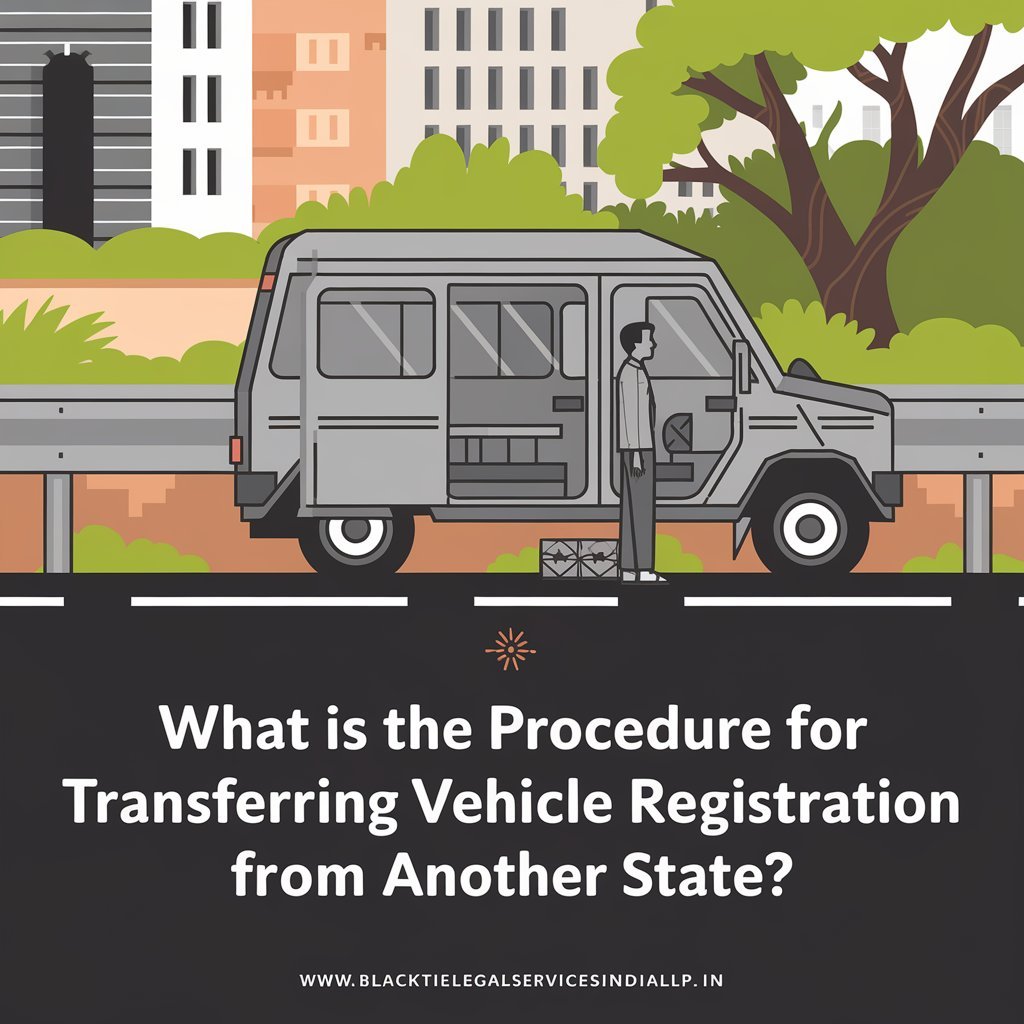
If you move to Karnataka with a vehicle registered in another state, you are required to:
- Penalties range from 2% to 4% of the tax due for each month of delay.
- Legal consequences, including seizure of the vehicle, in extreme cases.
- Additional interest charges may also be imposed on the unpaid tax amount.
What is the Green Tax for Old Vehicles?
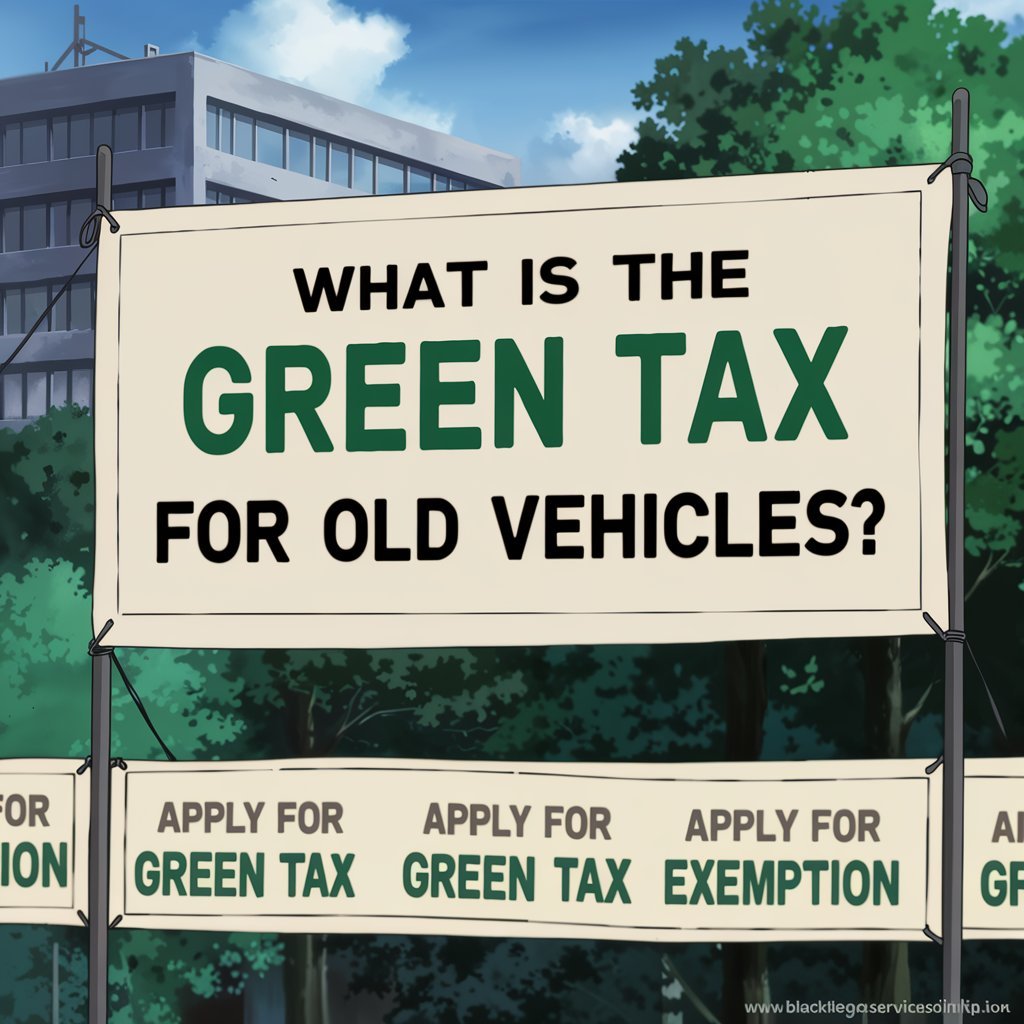
If you move to Karnataka with a vehicle registered in another state, you are required to:
- Passengers using private owners’ cars that have been in production for more than 15 years.
- Commercial vehicles that have been in circulation for more than 10 years. Green tax is another amount that is levied along with the road tax and was developed by the government as part of its efforts to reduce pollution caused by vehicles.
What is the Karnataka Road Tax for Company-Leased Vehicles?
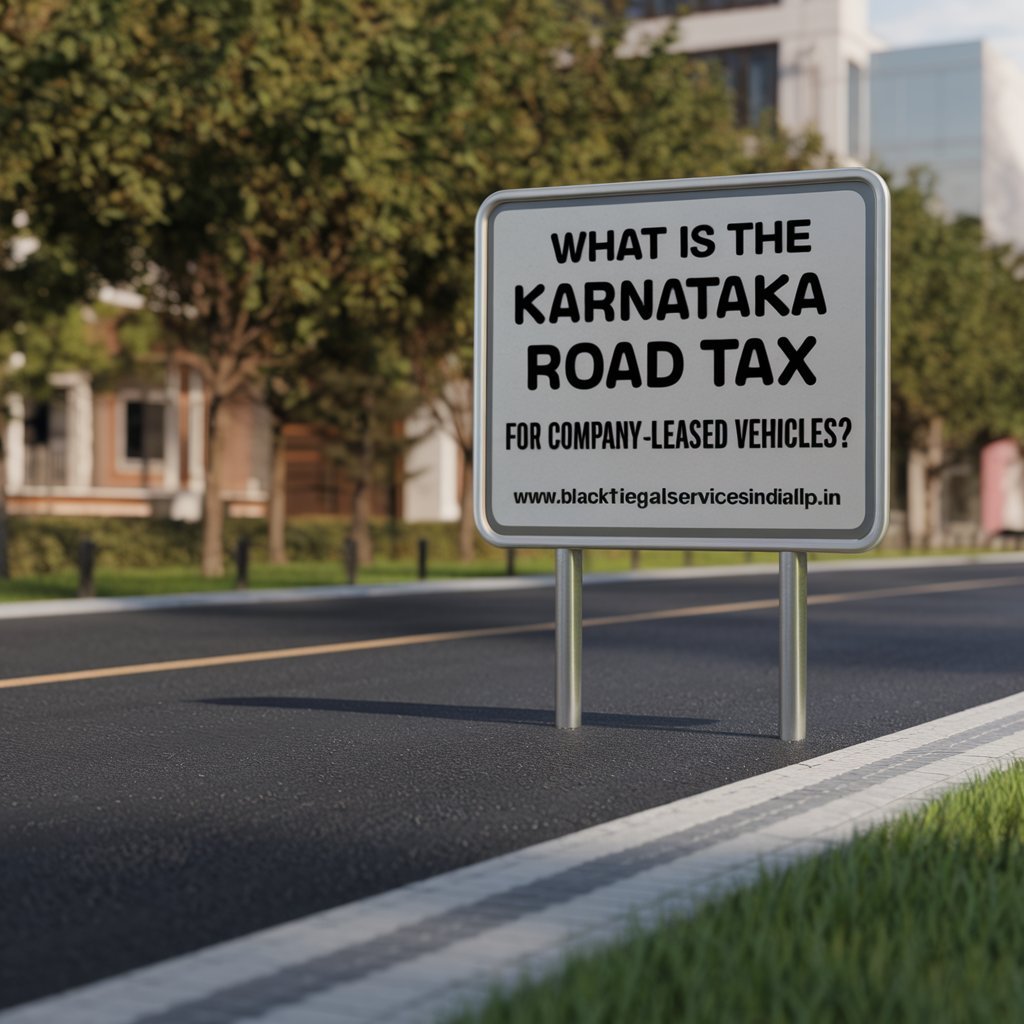
In the case of leased vehicles, road tax is calculated based on the price of the car and its usage. Vehicles leased for personal use may have different tax implications than vehicles used for business purposes.
Generally, it is the lessee who can be a company or an individual who is under the watch of the law to pay the road tax on time.
What is the Impact of Karnataka Road Tax on Vehicle Prices?
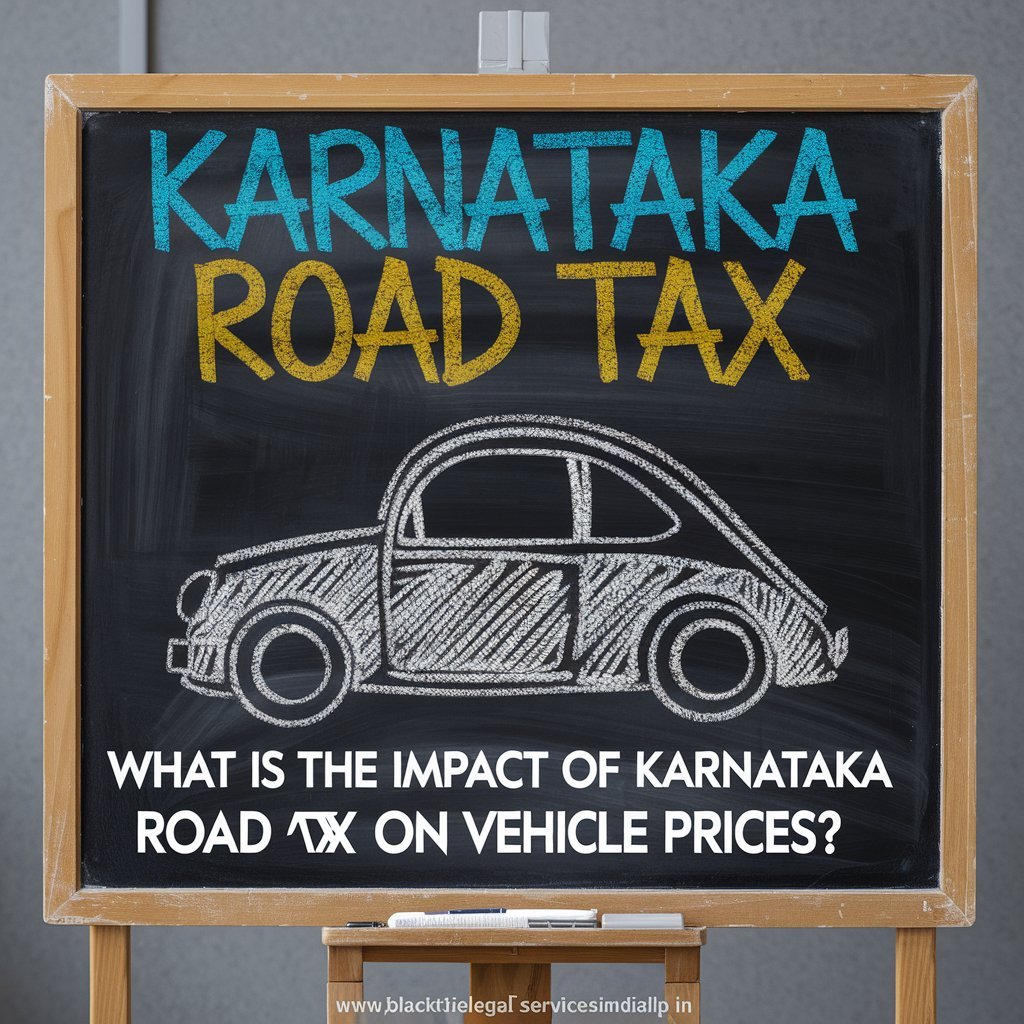
The tax levied on vehicles in the form of road tax in Karnataka is relatively high, especially for prestige cars, adding additional costs to the price of vehicles.
As a result, every buyer of a luxury car or premium motorcycle, for example, may end up paying more tax than a buyer from another state with comparatively lower taxes.
However, road tax in Karnataka is competitive for basic two-wheelers and small cars and is just as competitive as in other states.
What is the Special Road Tax for Goods Transport Vehicles?
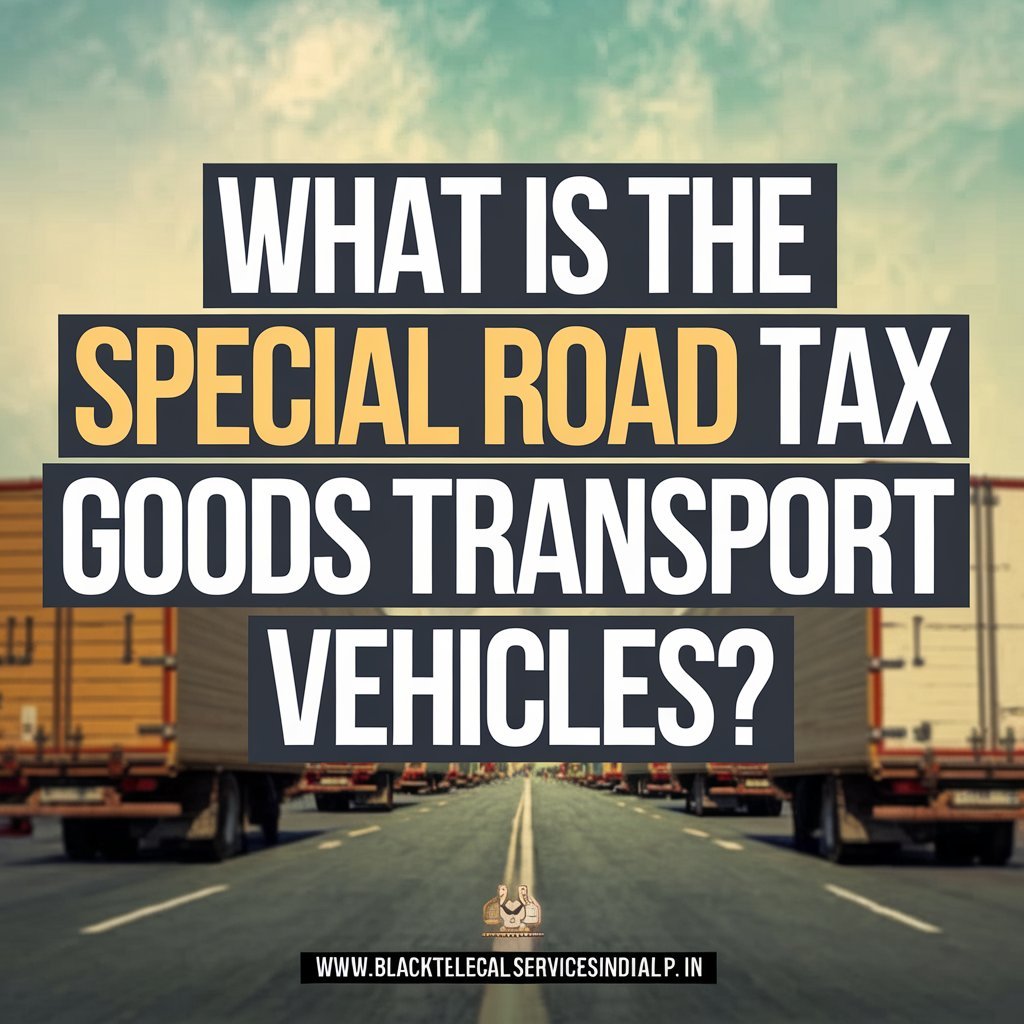
Road tax varies considerably depending on the GVW for various goods transport vehicles including trucks and lorries. Vehicles with higher gross vehicle weight (GVW) attract higher road tax than vehicles with lower GVW.
These taxes are calculated on an annual basis and are generally higher than the taxes levied on private vehicles as the latter use the road network less than commercial vehicles.
What are the Benefits of Timely Road Tax Payment?
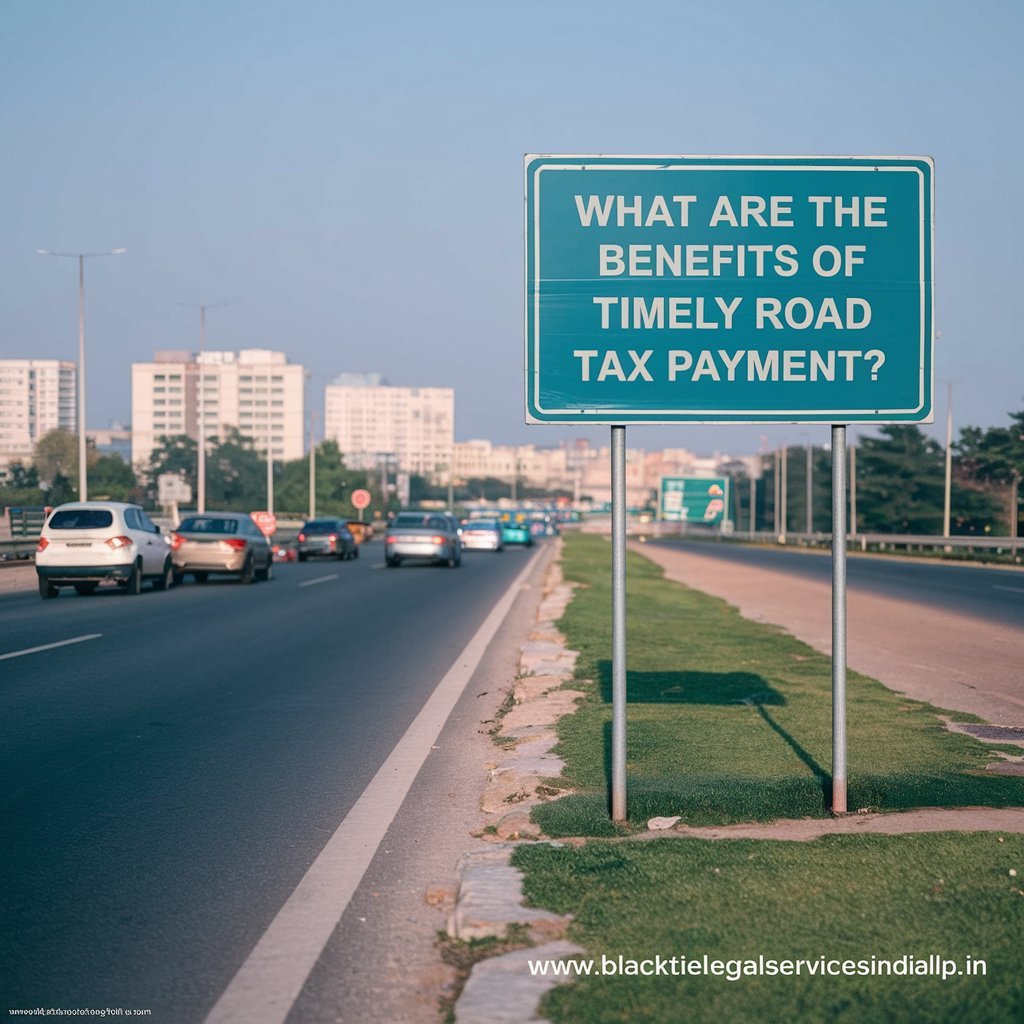
Paying road tax on time is very important for people who use vehicles frequently as it helps one avoid huge fines and also ensures that his car is legal as per the state laws.
Also, fast payment enhances a good relationship between buyers and sellers during the purchase and sale of vehicles, transfer, and even renewal of documents.
Such revenue is also required to apply for insurance claims or to avail of car loans or any other financial assistance.
What are the Recent Amendments and Updates in the Karnataka Road Tax Policy?
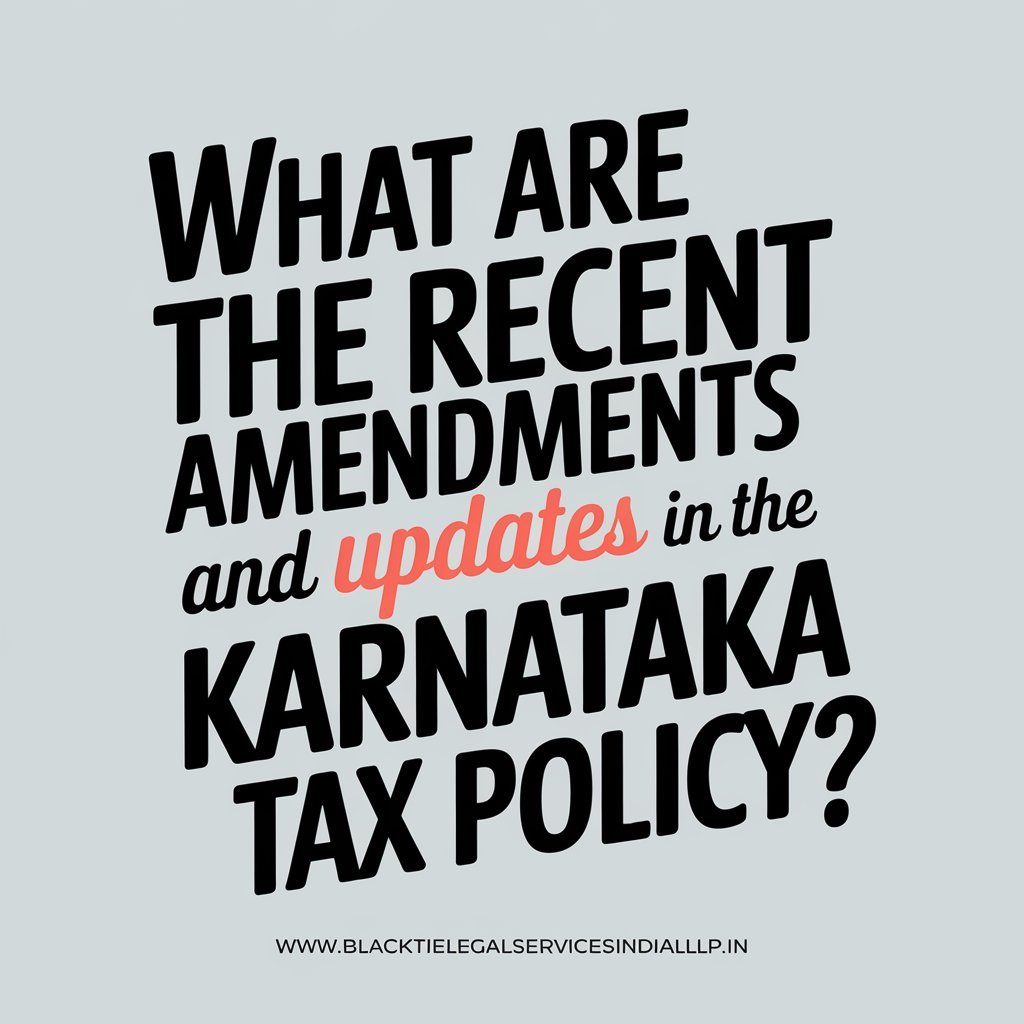
The Karnataka government has recently made several changes to deal with the challenges posed by changes in the automotive industry.
As a result, with the rapidly growing awareness about the use of electric cars, tax credits have been offered for eco-friendly mobility.
In this regard, new rules have been implemented regarding the disposal of old cars and taxes that make the use of polluting automobiles more expensive.
What is the Contact Information of the Karnataka Transport Department?
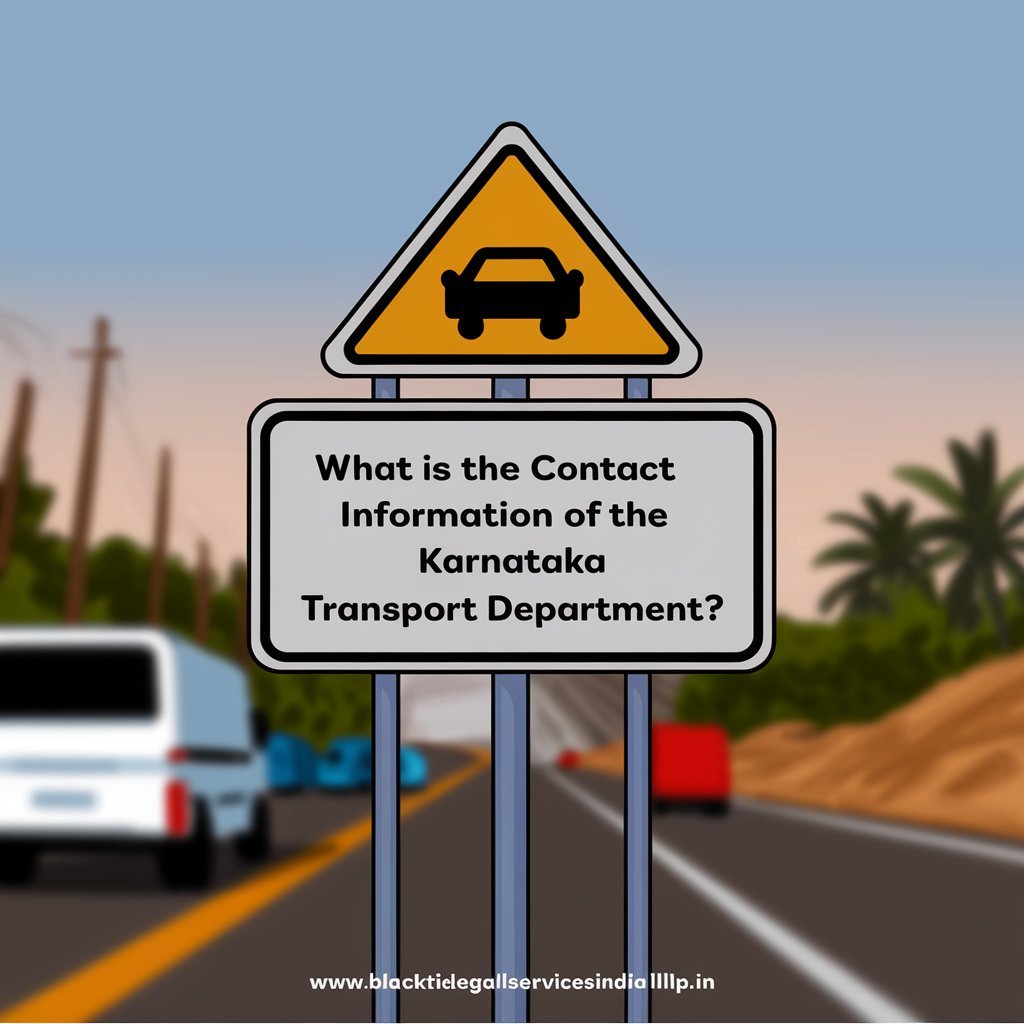
Here is the contact information for the Karnataka Transport Department in table format:
| Contact Information | Details |
|---|---|
| Department Name | Karnataka Transport Department |
| Office Name | Commissioner for Transport and Road Safety |
| Address | 1st Floor, TTMC Building, A Block, BMTC Shanthinagar, Bengaluru |
| City | Bengaluru |
| State | Karnataka |
| Pin Code | 560027 |
| Phone Number (General Inquiries) | +91-80-2221-0426 |
| Email Address | transcom@kar.nic.in |
| Website | https://transport.karnataka.gov.in |
In Conclusion

Karnataka road tax is one of the important state taxes for the development of the vast road network in the state.
Therefore, self-owned drivers and vehicle owners need information about road tax assessment criteria, payment and their process, and the consequences of non-compliance to facilitate easy ownership and use of these vehicles in the state.
In the case of the Karnataka government, the process of road tax payment especially the process of online tax payment has been made a bit simpler for vehicle owners to pay their taxes.
Also, the state of Karnataka has already pursued mass transit by promoting the proliferation of electric vehicles by providing tax incentives for recharging and focusing on sustainability.
FAQs
1. Can I transfer my vehicle to another person without paying the road tax dues?
No, the road tax dues must be cleared before the vehicle can be legally transferred to another person. The new owner will also need to ensure all applicable taxes are paid when they register the vehicle in their name.
2. Is road tax applicable if I am using my vehicle temporarily in Karnataka?
If your stay in Karnataka is temporary and you are using a vehicle registered in another state, you don’t need to pay road tax for the first 12 months. However, after a year, road tax becomes applicable, and re-registration is required.
3. Can I appeal against a road tax penalty?
Yes, if you believe that you have been unfairly penalized for road tax non-compliance, you can appeal at the local Regional Transport Office (RTO). You will need to provide supporting documents and evidence to justify your appeal.
4. What happens if my vehicle is stolen? Do I still need to pay road tax?
In case your vehicle is stolen, you should inform the police immediately and obtain a report. You will also need to notify the RTO. If the vehicle is not recovered, you can apply for a tax exemption or refund (if applicable), but this will require a formal procedure.
5. How is road tax calculated for vehicles converted to CNG or LPG?
If you convert your petrol or diesel vehicle to run on CNG or LPG, the road tax may be recalculated based on the new fuel type. You’ll need to submit conversion documents to the RTO to adjust the tax accordingly.
6. Can Karnataka road tax be paid in advance for multiple years?
For commercial vehicles, the tax is usually paid on an annual basis, but some categories may allow advance payments for several years. It depends on the vehicle type and intended use. Check with the RTO for available options.
7. Is there any special road tax for vintage or classic cars?
Vintage or classic vehicles, typically over 50 years old, may qualify for a different tax slab or even exemptions in some cases. Owners should check with the RTO for specific guidelines on registering and taxing such vehicles.
8. Can I pay Karnataka road tax in another state where I live temporarily?
No, road tax must be paid in the state where the vehicle is registered and where it primarily operates. If you are living temporarily in another state, the road tax paid in Karnataka will remain valid unless the vehicle is re-registered in the new state.
9. Is it possible to get a tax exemption for vehicles used for specific purposes like education or healthcare?
Vehicles used by educational institutions, hospitals, and certain non-profit organizations may be eligible for tax exemptions or reduced rates. Applications for such exemptions must be submitted with proper documentation proving the vehicle’s use for specific purposes.
10. Does Karnataka Road Tax differ for imported vehicles?
Yes, imported vehicles generally attract higher road tax due to their higher market value and different customs duties. The tax is based on the vehicle’s price and specifications, and owners should consult the RTO for detailed guidelines.
11. What should I do if I lose my road tax payment receipt?
If you lose your road tax payment receipt, you can request a duplicate copy from the RTO. It’s important to have proof of payment for any future transactions involving your vehicle, including sale, transfer, or insurance claims.
12. Can I transfer my vehicle from Karnataka to another state without paying additional road tax there?
When transferring a vehicle to another state, you will need to pay road tax according to the rates applicable in the new state. You can also apply for a refund of the remaining road tax amount in Karnataka after completing the transfer.
13. Is road tax mandatory for vehicles used exclusively on private property?
Vehicles that are used only on private property and do not use public roads may not be subject to road tax. However, the vehicle’s use must be clearly documented, and exceptions are determined on a case-by-case basis by the RTO.
14. Do vehicles used for charitable purposes receive any road tax benefits?
In some cases, vehicles used exclusively for charitable purposes, such as mobile clinics or ambulances operated by non-profit organizations, may receive tax exemptions or reductions. Proper documentation is required when applying for these benefits.
15. Can road tax be adjusted if I modify my vehicle?
Yes, if significant modifications are made to your vehicle, such as changes to its engine or purpose of use, the road tax may need to be recalculated. You’ll need to inform the RTO about these changes and update your vehicle records accordingly.


Add a Comment